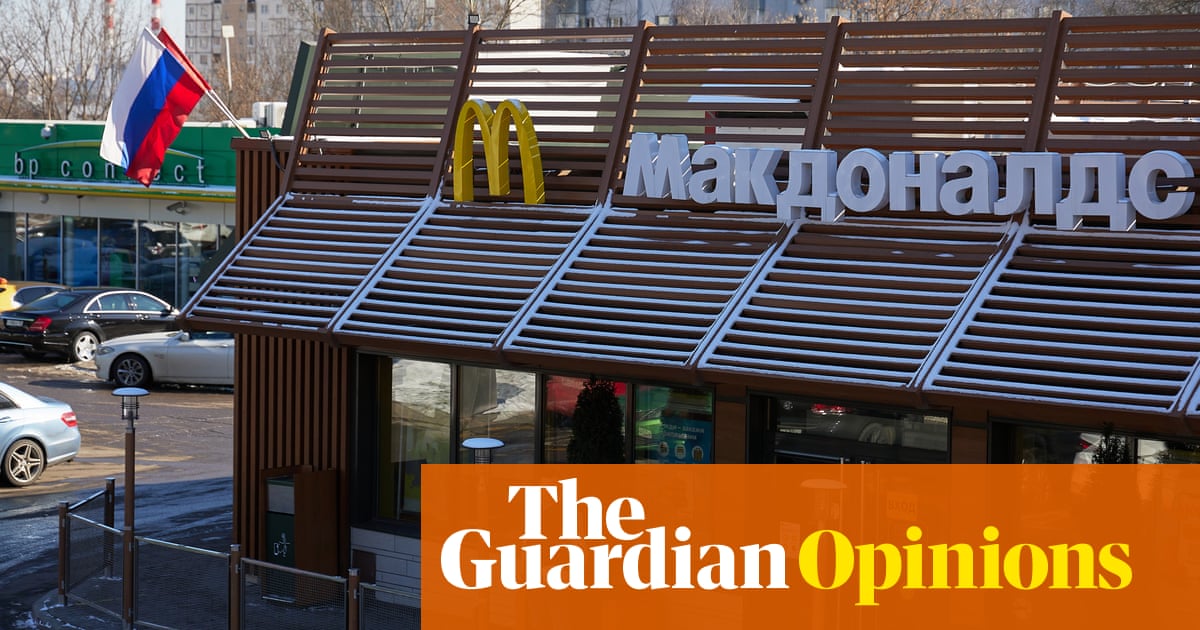Show caption ‘The high tide of globalisation has passed for now; the question is how far the water will drop.’ Photograph: Oleg Nikishin/Getty Images Opinion The Guardian view on deglobalisation: McDonald’s quits Moscow Editorial The exodus of western brands in response to Russia’s invasion of Ukraine contributes to an existing economic shift Fri 11 Mar 2022 18.30 GMT Share on Facebook
Share on Twitter
Share via Email
The Golden Arches Theory of Conflict Prevention once proposed that no two nations with McDonald’s franchises would go to war; people in those kinds of economies would rather queue for burgers. The thesis was not only crass, but soon disproven. Yet it nodded to a broader truth: that economic ties were drawing countries closer together, creating a global interdependence which would not quickly be undone.
Times have changed. On Tuesday, the American fast-food giant suspended its operations in Russia. It is part of a dramatic exodus by international brands – from Uniqlo, Netflix and Chanel to Apple, PwC and American Express – due to Vladimir Putin’s invasion of Ukraine, the western sanctions imposed in response and the public outcry. Shell and BP are selling their Russian assets. Britain and the US are banning Russian oil, while the EU is slowly phasing out gas imports, on which it is heavily dependent. On Friday, the US announced that, with allies, it was revoking Russia’s “most favoured nation” status.
This huge and abrupt retrenchment is contributing to an existing economic shift of deglobalisation. The arrival of McDonald’s in Moscow in 1990 exemplified the incoming tide of global integration. Economic liberalisation in China, the Soviet Union’s collapse and the advent of new technologies created a world connected as never before – one in which it would soon seem mundane for a Russian oligarch to own an English football club; for a Chinese state firm to invest in a British nuclear plant; for American teens to dance to Korean pop on a Chinese-owned app; for identical products to be sold from Dubai to Durban and Bangkok to Buenos Aires.
The economist Douglas Irwin argues that the financial crisis of 2008-09 marked the moment the process slowed, then reversed. The costs of globalisation, from the impact of shocks far away to the stunting of industrialisation in parts of Africa and low wage growth in developed nations, became increasingly evident and fostered populism. Donald Trump’s love of tariffs and trade war with China accelerated the protectionist trend. Beijing excluded US internet giants and increasingly looked towards domestic consumption and self-sufficiency in key technologies.
The pandemic dramatically demonstrated the vulnerabilities in long supply chains, and made countries look closer to home. Narendra Modi announced a Self-reliant India scheme; Japan introduced incentives for companies to onshore production. Emmanuel Macron, the French president, declared that “this kind of globalisation was reaching the end of its cycle” anyway.
The change should not be overstated. Most of the companies pulling out of Russia have said they are only pausing their business – though Moscow has now threatened to seize the assets of western firms exiting the country. It is doubtful that they would be so quick to quit China, where a much larger market is at stake: thousands, not hundreds, of McDonald’s branches. Concerns about human rights there are regularly brushed aside.
Deglobalisation does not mean we will see a new age of autarky – the kind of drastic reversal seen in the 1920s and 30s, when protectionism surged and global trade collapsed. Even the emergence of discrete spheres of activity, cold war-style, would be a very big shift; China has boosted economic ties with Russia, but its trade with the EU and US is far greater. The pandemic demonstrated the need for international cooperation as well as national self-reliance – and if we are to tackle and adapt to global heating, technology transfer will be central. But the high tide of globalisation has passed for now; the question is how far the water will drop.
